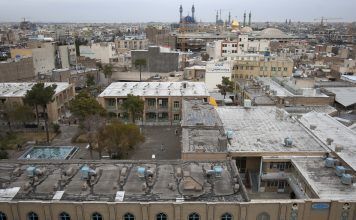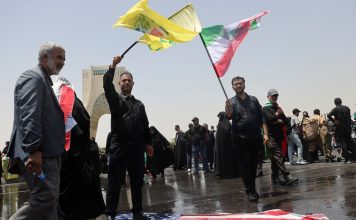By Ahmad Rafat
Narges Mohammadi, winner of the 2023 Nobel Peace Prize, is an Iranian journalist and human rights activist serving a 16-year sentence in prison. She has been detained a total of 13 times in the course of her lifetime.
The Nobel Peace Committee selected Narges Mohammadi for her “struggle for oppressed women in Iran.” The statement highlighted her work “to promote human rights and freedom for all.”
Narges Mohammadi returned to prison most recently in mid-April 2022. Her most recent sentence was to 16 years’ imprisonment in May 2016.
She has been fighting against mandatory hijab and discriminatory laws against women for years. She has twin children, Ali and Kiana, who have been living away from their mother in Paris for 8 years with their father, Taghi Rahmani, a former political prisoner.
A few days before she returned to prison on April 6, 2022, she spoke in a telephone conversation with this writer about the anti-women policies of the Islamic Republic.
She called the Islamic Republic an “authoritarian, religious, and misogynistic government” and added: “The survival and authority of the Islamic Republic are based on three principles: tyranny, religion, and misogyny.”
The activist further pointed to the religious nature of the system and said: “Those who are familiar with religion believe that the most ossified religious strata have taken power in different parts of the Islamic Republic.”
According to Narges Mohammadi, the third factor that the ruling system in Iran is based on is “misogyny.” This misogyny is “crystallized both in the laws of this country and in the behavior of government officials in various fields.”
“Discrimination against women can be seen in all fields in the Islamic Republic,” she said. “The government is trying to display this misogynist trait in different periods and in different subjects, which is a repressive and degrading trait. In fact, the government wants to control the entire society by humiliating and discriminating against women.”
During the conversation, Mohammadi also held men partly responsible for the prevailing situation and noted: “The violation of the rights of half of society, namely women, in practice means giving superior rights to the other half, namely men, in various fields such as the right to divorce, custody of children, inheritance, polygamy, and many others. Accepting these unequal rights by men is subject to criticism and objection.”
“When I was spending the first years of my 16-year sentence in prison, and one of my charges was opposing discrimination against women, Abulqasem Salavati, who was the head of the court, said, ‘You are a criminal because you oppose polygamy, the right to divorce for men, and the law that forces women to receive half of what men inherit. All of these are mentioned in the Quran, so you are a criminal.’”
“In prison, I thought that although the Islamic Republic sentenced me to 16 years in prison, the reason for this sentence was the superior rights that this government has established for men. This raised the question for me of whether men know that the government is using them to perpetuate this injustice against women. If men had not accepted these privileges for themselves from the beginning of the revolution, could the government have imposed so much discrimination against women? Why does Narges Mohammadi have to go to prison decades later for protesting against these inequalities? Isn’t it time for men to stand up against the placement of women in subordinate positions and to rise up in their own superior positions?”
Mohammadi also referred to the issue of sexual violence against women, especially in the workplace. “Violence against women in the Islamic Republic is systematic and purposeful, and its reflection can be seen in various layers of society,” she said. “When child marriage is legally common and even considered a value in a country like the Islamic Republic, one cannot be surprised by violence in other layers of society. Recently, 300 female filmmakers referred to sexual violence against women in the workplace in a letter. However, what is important in this letter is not the discussion of sexual violence but rather that the women who signed the letter emphasized that their protest is not being heard, and their complaints are not being addressed. This silence in the face of women’s protests and complaints has made these acts of violence systematic and purposeful, but women are no longer willing to remain silent. Although they pay a heavy price for their resistance to this violence, they display their power in this way.”
She was first arrested in April 2010 and spent some time in Tehran’s Evin Prison. In 2011, she was sentenced to 11 years in prison in Tehran’s Revolutionary Court, which was reduced to six years in March 2012.
However, in May 2015, Branch 15 of Tehran Revolutionary Court sentenced her to 16 years in prison again on several charges, including being a member of “Legam” (the campaign to progressively abolish capital punishment). Abolqasem Salvati, head of the 15th division of the Tehran Revolutionary Court, accused her of being a feminist and propagandizing against the regime.
Narges Mohammadi was released from prison in October 2020 after contracting Covid and several other illnesses but was returned to prison in mid-April 2022.













